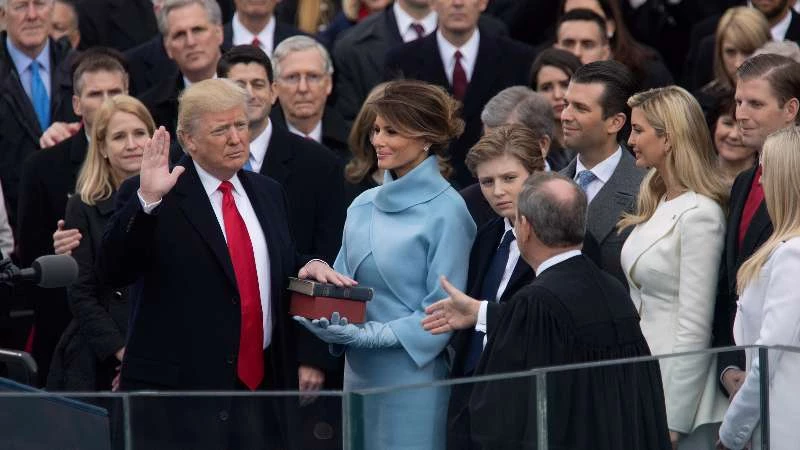Trump took the Oath of Office on January 20 and pledged to end what he called the "American carnage" of rusted factories and crime in an inaugural address that was a populist and nationalist rallying cry. Protesters opposed to Trump clashed with police on the streets of Washington that same day.
A day after the inauguration, the Women’s March saw demonstrators fill the streets of Washington and elsewhere across major American cities to lead an unprecedented wave of international protests against President Donald Trump.
The businessman turned world leader stressed his dealmaking abilities throughout the primaries but struggled to pass legislation concerning two of his biggest campaign promises - immigration reform and repealing Obamacare.
Trump’s January executive order temporarily barring refugees and nationals from seven countries from entering the United States caused chaos at airports and sparked mass protests before a Washington state judge stopped its enforcement in February.
The seven-year Republican quest to scrap Obamacare, a major campaign vow by President Donald Trump, was also left in ruins during after Congressional leaders failed to dismantle the healthcare law.
In April, the US military launched 59 Tomahawk missiles from two US Navy destroyers at an Assad airfield and targets included aircraft and air defense systems, in response to a chemical weapons attack Trump called "a disgrace to humanity."
Many who had been angered by Trump’s efforts to ban Syrians, along with visitors from several other Muslim-majority nations, welcomed what they saw as his new role as the avenger of civilians killed in the chemical weapons attack.
But the one constant that surrounded the Trump presidency was and remains the investigation into possible Russian meddling in the 2016 election.
Trump ignited a political firestorm in May by firing FBI Director James Comey, who had been leading an investigation into the Trump 2016 presidential campaign’s possible collusion with Russia to influence the election outcome.
Trump said Comey’s testimony before Congress after his firing showed "no collusion, no obstruction." Former FBI director Robert Mueller was subsequently appointed as special counsel in the investigation.
In late October, Trump’s former campaign manager Paul Manafort and another aide, Rick Gates, were indicted on money laundering and conspiracy charges.
Both men pleaded not guilty before a magistrate judge to a 12-count indictment including charges of conspiracy against the United States and failing to register as foreign agents of Ukraine’s former pro-Russian government.
As back-to-back hurricanes lashed the United States, Trump earned praise from some for the response to Texas and Florida, but came under fire weeks later for what some claimed was a less engaged response to hurricane damage in Puerto Rico. Trump drew criticism for speaking about Puerto Rico’s debt during a crisis that at one point left nearly the entire island without power. Trump, who grappled with hurricanes Harvey, Irma and Maria, said at a briefing in early October that the disasters were straining the U.S. budget. Critics also said the government was slow to address the crisis.
Pyongyang’s July launch of intercontinental ballistic missiles escalated tensions escalated between US and North Korea. Trump told the recluse nation it would be met with "fire and fury like the world has never seen" if it threatened the United States again.
A year after clinching the presidency, Trump has not backed away from the occasionally hyperbolic language and stinging personal attacks that captivated the public throughout the election. He has ignored calls to stop tweeting - embracing his direct path at communicating with the American people.
The former reality TV who danced to the song ’My Way’ by Frank Sinatra at his inaugural ball has continued to delight his political base and enrage his critics, but one year on, a Reuters/Ipsos daily tracking poll shows Trump’s popularity is eroding in small towns.
Trump’s 12-day trip to Japan, South Korea, China, Vietnam and the Philippines, ending on Nov. 14, takes him out of Washington at a time when he has been beset by the intensifying federal investigation into Russian meddling in last year’s election and debate over a Republican tax-cut plan that if approved by Congress would be Trump’s first major legislative victory.



التعليقات (0)